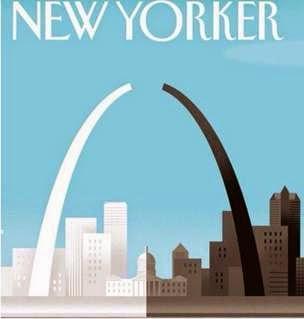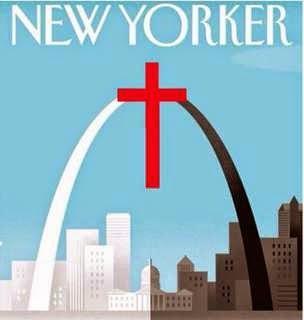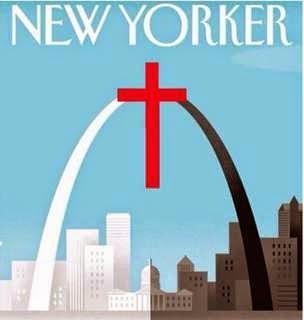Here is the cover art from the New Yorker:
Cover Story: A “Broken Arch” for Ferguson

The introductory sentence to their accompanying article is a quote,
“I wanted to comment on the tragic rift that we’re witnessing,” Bob Staake says about his cover for the December 8th issue, arriving next week. “I lived in St. Louis for seventeen years before moving to Massachusetts, so watching the news right now breaks my heart. At first glance, one might see a representation of the Gateway Arch as split and divided, but my hope is that the events in Ferguson will provide a bridge and an opportunity for the city, and also for the country, to learn and come together.”I won't comment on the actual events that sparked the article and story art. The news that inspired the story and cover art isn't the point of this essay. You can read a summary here and also a very good essay by Pastor Voddie Baucham here. In it, Baucham speaks to the root of the problem and how to solve it.
Sinful people do what sinful people do. The opening sentence of the news story above is "the world watched live as crowds hurled bottles, looted liquor stores and set this city on fire in the 24 hours after a grand jury announced it would not indict police officer Darren Wilson in the shooting death of Michael Brown, 18."
Didn't the world watch live as riots occurred after the judicial verdict in the OJ Simpson case? The Rodney King verdict? ("Can't we all just get along?"). The Zimmerman verdict riots? The 1965 racial inequality accusations that sparked the Watts Riot? Many people consider the Watts riot (which was the most bloody, violent US riot until Rodney King in 1992) to be a turning point in Black-White civil rights movement.
What are these systemic issues that keep turning a society upside down? Poverty? Racial inequality? Police brutality? Social oppression? Poor education? The post riot commentary on each of the above-mentioned riots all put forth different reasons for their cause and thus have different approaches to the solution.
However on Twitter, one man solved the St. Louis Gateway Arch divide this morning. Teaching Pastor of Summit Wentzville Clayton Pruett tweeted:
I fixed the New Yorker's separated Arch problem #gospel #hope

This is more than a trite acknowledgement of Jesus as the solution to everything. It needs a deeper moment of thought than a nod, smile and a scroll past.
Some time ago I listened to Voddie Baucham preach his text. He had been alternating with another pastor as they went through Romans. Pastor Baucham was up to the closing, Romans 16:3-16. The title of his sermon is "An Extraordinary Affection for an Extraordinary Church" In the summary of the sermon, it is stated,
Most people today skip over sections of scripture like these because they do not see the relevance of a "list of names". In this sermon, however, Pastor Voddie Baucham reveals the true depth of the affection that Paul has for the believers at Rome. It is an extraordinary affection for an extraordinary church!Here are the names Paul wrote greetings for, and each name was accompanied by a commendation, which I have not included,
Greet Prisca and Aquila, EpaenetusMary Andronicus and Junias Ampliatus UrbanusStachys Apelles in house of Aristobulus HerodionGreet those of the household of NarcissusTryphaena and TryphosaPersis RufusAsyncritusPhlegon HermesPatrobasHermas Philologus JuliaNereus Olympas
This is more than a mere "list of names". First, it reminds us that our Holy God has affection for individuals He inspired Paul to write by name. It gives us a picture of an an extraordinary affection the Apostle Paul had for an extraordinary church.
Pr. Baucham joked that as pastors when they look at the preaching schedule and see that they will be responsible for the passage that has the "list of names" they become overjoyed. He was speaking with a gentle sarcasm and a wry realism. He said more often they say, "Really? I got the list of names? Again?" [audience laughter]
But he said as he began to dig deeper, he found beauty. Allow me to summarize his sermon. Trust me, this will relate back to Ferguson and the broken arch that the cross fixes. In the Romans passage there is a picture of unity that had tremendous implications for Paul and his theology, that would have brought him great joy. It relates to the passage in Galatians 3:26-28,
So in Christ Jesus you are all children of God through faith, for all of you who were baptized into Christ have clothed yourselves with Christ. There is neither Jew nor Gentile, neither slave nor free, nor is there male and female, for you are all one in Christ Jesus.
There is no other entity on planet earth that unites people across ethnic lines like the church. ~Voddie Baucham.
The Apostle mentions male and females, Jews and Greeks, slaves and freemen. Beyond the surface of thinking we are saturated in today's culture, back then, women had little to no value. Even their testimony was counted for half of a man's. Today in Islam, a female's testimony is worthless in court. Yet one-third of the names in the list are women. That was not normal in the first century. And Paul not only included women int he list but commended them as co-laborers! This list is a beautiful picture of the unity of gender we share through Christ.
Andronicus and Junias were Jews, as Paul used to be, as were Prisca and Aquila and several other names. Their names are intermingled with Greek names like Hermes, Narcissus, Aristobulus. Paul who had been raised all his life to believe that if you even came into contact with a Greek you became ceremonially unclean now. He included them in his list, commends them, and joyously shraes equal standing with them.
"It is the work that Christ has done in us that draws us to one another in spite of the fact that we're not the same," Baucham preached.
From the beginning, Christ broke down dividing walls. It isn't because of a common fear that we have of police or any other government authority. It isn't because of a common enemy we have, (except the enemy the devil), it is because of the Savior we have in common, our common Father.
A surface reading of the text will not readily show the names that are male and female, unless you know the masculine versus feminine endings in the Greek. As for the slaves vs. freemen, a deeper reading will need to be done to show who they are. Several names in this passage were well known slave names. Many of these names are gathered at the end of the list. Persis was a common slave name. Rufus was an extremely slave name.
There is always a strict divide between people who hire people to serve them and people who serve. "Upstairs, Downstairs" is a well-entrenched division. It would have been unusual enough for any organization or gathering of people to accept mingling of servant and employer. However Paul'' inclusion of slave names among the list of free names was a startling departure from a cultural norm. As Baucham says, no one thought favorably of the group of people known as slaves. No one can own another person and think favorably toward them as a whole because they must be thought of less-than, not equal-to. So here in Romans we have a vision of extraordinary unity.
This list of names goes beyond, well beyond common acceptance. To further deepen the picture, think of the implications. A systemic and accepted dividing of men into different classes, here, slave and free, on Sunday, had disappeared because slave and master sat together in church. Slave and Master attended together, worshiped together, and praised their Lord together. This is highly uncommon in any culture.
Where Christianity flourishes, slavery ends. Caste system ends. Dividing lines over race, status, ethnicity ... ends.
Only Jesus can make a man realize he is no better than his slave. Only Christ can do that. We stand as one before the Lord.
After this I looked, and behold, a great multitude that no one could number, from every nation, from all tribes and peoples and languages, standing before the throne and before the Lamb, clothed in white robes, with palm branches in their hands, (Revelation 7:9).
For Ferguson Missouri, Christ is the answer, as it always has been and always will be. The transcendent cross, our Savior Jesus died on then rose from, unites us despite our differences, which are only surface after all. We share our sin in common, and we share our need for Jesus in common. Through Him and His blood, we unite, washed in common. The problems in Ferguson are no different than the problems in slave-saturated Rome, in caste-rigid India, in oppressed Iraq. The issues aren't racial, they're sin-ful.
Please take another look at the marvelous cross and praise a Savior who is not from earth but came to earth to reconcile sinful men and people so fall races, tribes, colors and status to Himself as a united ONE.

